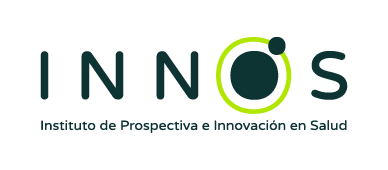About INNOS
We are imagining the future of healthcare


INNOS is a joint initiative between AFIDRO (Asociación de Laboratorios
Farmacéuticos de Investigación y Desarrollo) and Universidad El Bosque which seeks to contribute to the national dialogue on health based on scientific
knowledge and innovation, with a forward-looking approach.
Mission
We connect the knowledge and thinking of scientists, academics, experts
and innovators in health to support the solution of the challenges faced by public
policy makers, the community and health system agents in order to improve the
health of Colombians.
Vision:
INNOS will be recognized by the National Government, Congress and
Health System Agents as a benchmark in the dialogue between Knowledge and
Policies for the Future of Health in Colombia.
Who we serve
The need for technical information and scientific knowledge is a
relevant issue for many of the agents within the health system; which is why from
INNOS we propose a constructive dialogue that allows for the exchange of
opinions based on technical and scientific grounds, with the aim of making better
informed decisions to improve the health of the Colombian population.

How we do it?
Our work is built around the following four pillars, with the purpose
of making scientific knowledge accessible for agents involved in healthcare
decision-making processes:
1
We analyze and nurture decision making
We develop lines of work
and research to produce analyses that promote constructive
dialogue and facilitate decision making, based on scientific evidence
and argumentation.
2
We bring in experts
We identify experts and invite them to
contribute with research and proposals. We carry out a rigorous
curation to select scientific content from third party sources,
relevant for enriching the discussion on health.
3
We connect
We facilitate access to scientific knowledge to diverse
audiences through clear and accessible language, while integrating
diverse perspectives. In addition, we promote a constructive
dialogue with the different players within the health system.
4
We support training
We create and curate pedagogical content to
complement and offer new perspectives to the training of health
sector agents.
Editorial Committee

Catalina Bello Durán
Directora de Acceso y Sostenibilidad de AFIDRO

Gabriel Tadeo Rodríguez
Académico de la Universidad El Bosque

Alejandro Gómez
Coordinador Académico de INNOS

Carlos Eduardo Maldonado
Académico de la Universidad El Bosque

Miller Gallego
Director Editorial Universidad El Bosque

Guillermo Ortíz
Académico de la Universidad El Bosque

María Angélica Sánchez
Directora de Asuntos Regulatorios y Científicos de AFIDRO
Tactical team

Raquel Sorza
Gerente Legal y de Asuntos de Gobierno de AFIDRO

Juan Carlos Suárez
Director de la Oficina Legal de Innovación – enlace del HUB iEX de la Universidad El Bosque

Alejandro Gómez
Coordinador Académico de INNOS

Brandon Hernández
Coordinador de Gestión y Seguimiento

Carlos Felipe Escobar
Director
Governance
Steering Committee

María Clara Escobar
Presidente Ejecutiva de AFIDRO

María Clara Rangel
Rectora de la Universidad El Bosque

Eduardo Leyva
Gerente de AbbVie Región Norte

Hugo Cárdenas
Decano de la Facultad de Medicina de la Universidad El Bosque

Jairo Restrepo
Coordinador del Grupo de Economía de la Salud
Lines of thought
These are fundamental areas for the construction of a modern, quality health system
that incorporates scientific advances and global innovations in a sustainable manner,
within a solid and stable framework of the protection of intellectual property.
Three cross-cutting areas/perspectives
Three cross-cutting areas/perspectives

Innovation in healthcare
The 4th Industrial Revolution has fostered the
strengthening and expansion of practices such as telemedicine, remote
robotic surgeries, remote control of clinical trials and the use of artificial
intelligence for therapeutic purposes. These are developments that are
advancing at great speed worldwide and merit follow-up and
understanding to facilitate their adoption and adaptation at the national
level.

Health research
Processes aimed at obtaining new knowledge and
applications that provide solutions to health problems in individuals,
communities and the population in general.
Creating the possibility of establishing the state of the art in different issues
within the sector to close gaps in terms of access to information, coverage
and quality of processes.

Intellectual property
It is the base on which the development of new products and processes for treatments and cures is built. Intellectual property is a key element in the generation of solutions that improve patient care, stimulate economic growth and strengthen an innovation economy. Supported by a robust modern intellectual property system, researchers explore new areas of medical innovation and discover the results that will lead to new treatments and cures.
Four areas that require a specialized thematic approach

Public health
Identification of pathologies, issues and needs of public health in
Colombia, in order to generate analysis and propose debates that lead to the
implementation of effective solutions.

Advanced therapies
From the sequencing of the human genome and secondarily
from the increasingly frequent identification of tumor and biological markers, the
advent of novel and targeted therapies demands the dissemination and transfer of
knowledge for all agents involved in health sciences.

Innovative access models
Not only do they maximize the efficiency, effectiveness
and safety of acquired treatments, but they also stimulate investment. These
models make it possible to combine the work of the government with private
companies in order to make public spending more efficient. Their main objective is
to facilitate access to innovative medicines that guarantee a real impact on
people's health and quality of life, as their effectiveness is the main requirement
for their acquisition. In this scheme, payment is based on results, not on the
volume purchased.

Sustainability of the health system
All health systems in the world share the challenge of providing the best treatments to their users, while ensuring environmental, social and economic sustainability that allows maintaining coverage and quality of service in the medium and long term and in a universal manner. promoting well-being for all. This debate invites us to analyze different models and innovations that provide alternatives to growing populations with greater health care needs and in accordance with the challenges of the 2030 Agenda.
